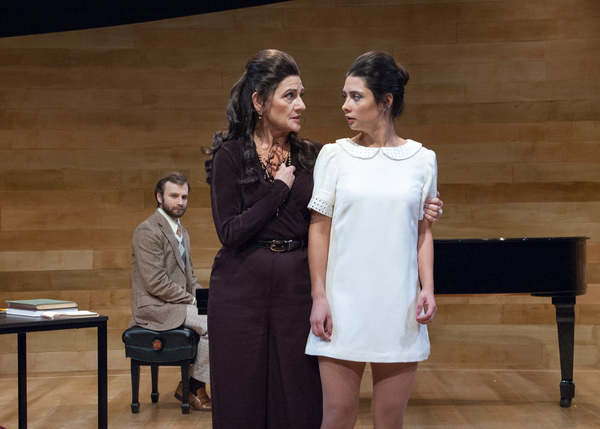
(© Lara Goetsch)
In 1971 and 1972, at the sunset of her career, Maria Callas taught a series of master classes at the Juilliard School. She had not performed onstage since 1965, and rumors swirled that reckless singing had cost her her voice. But she was still "La Divina" — the most famous opera singer of her generation — and her mentorship was in high demand. In 1995, playwright Terrence McNally fictionalized Callas's pedagogical exercises with Master Class, a sharply comedic character study. Callas has been played by such divas of the stage as Zoe Caldwell, Patti LuPone, and Tyne Daly, and now, in a Timeline Theatre production playing at Stage 773, Chicago actor Janet Ulrich Brooks takes her shot at the role.
No production of Master Class can succeed without a first-rate performer as Callas. Luckily, Brooks is just that. With formidable physicality and a powerful, controlled voice, she tirelessly commands the stage throughout both acts. Her Callas is always self-aggrandizing, even when listing her own faults — she seems to relish remembering her younger self as "fat and ugly," and she spits out her birth name, Maria Anna Cecilia Sofia Kalogeropoulos, with the slightest hint of mockery.
As she instructs three students, Callas retreats into her own recollections. The first young singer, Sophie DePalma (Molly Hernández), cautiously stumbles through an aria from La Sonnambula as Callas recalls her childhood and musical education in Axis-occupied Greece. A swaggering tenor named Tony (Eric Anthony Lopez) sings from Tosca, triggering memories of Callas's much-publicized affair with Aristotle Onassis. And when Sharon (Keirsten Hodgens) tackles Verdi's Lady Macbeth, Callas is sent into a fugue state of memory and contemplation on the sacrifices necessary for artistic genius.
As written by McNally, the students of Master Class are thin sketches who exist primarily to develop Callas's character. Nonetheless, the three young performers occupying the roles give stirring performances, both as actors and singers, under Doug Peck's music direction. Hernández in particular shines, both vocally and as an object of sympathy. When she's not putting her students through their paces, Callas is terrorizing the recital hall's stagehand (Raymond Hutchinson) and her adoring accompanist, Manny (the likable Stephen Boyer, who plays beautifully).
Staged with refined simplicity by Nick Bowling, Master Class is a technical success. Arnel Sancianco's set design takes the familiar elements of a collegiate recital hall and reshapes them exquisitely. The simple pale wood surfaces arch and twist to resemble the curves of the Steinway that sits onstage. Against the light wash of the set, further emphasized by Jessica Neill's lighting design, Brooks stands out emphatically in her all-black ensemble, designed by Sally Dolembo.
When Callas disappears into her long reflective monologues, the music being played and sung onstage merges into recordings of Callas's live performances, an effect that is masterfully managed by sound designer Andrew Hansen. These moments are the trickiest in the play, verging on camp. But in these sequences, Brooks is as careful as Callas was reckless. She avoids the histrionics of fully playing all of the characters in her memories, instead keeping her flashbacks closer, smaller, more conversational. It's the right choice for the small stage. Maria Callas may have been larger than life, but in this production of Master Class, she is searingly human.








